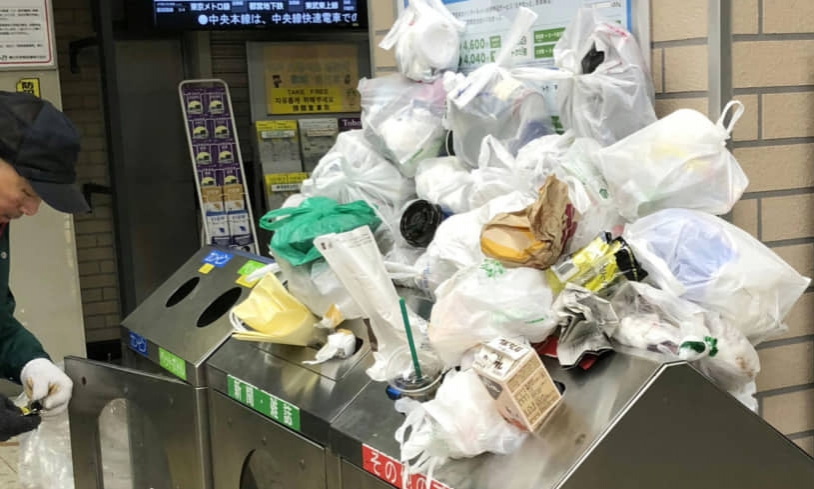 Starting July 2020, during the 2020 Summer Olympics and Paralympics, Japanese retailers will start charging their plastic bags. Initially, the program was set for May 2020. Why not before the Olympics? (Image via The Japan Times)
Starting July 2020, during the 2020 Summer Olympics and Paralympics, Japanese retailers will start charging their plastic bags. Initially, the program was set for May 2020. Why not before the Olympics? (Image via The Japan Times)
Retailers in Japan to charge plastic bags starting summer 2020
On Friday, a panel, consisting of environment and industry ministries, agreed that starting 2020, all Japanese retailers are required to impose additional charge for plastic bags. The move, aiming to reduce marine plastic waste, was proposed in June during Group of 20 (G-20) Summit in Osaka, Japan.The move included Japan to the list of countries that already charge its customers for plastic bags. In the document studied on Friday, the plan aims to build the habit for the Japanese people to bring their environmentally-friendly bags as a part of their lifestyles.
The plan exempts certain types of environmentally-friendly bags such as plant-based bags with at least 25% of biomass plastic. Bags that dissolve into water and carbon dioxide and reusable bags with a minimum thickness of 0.05mm are excluded in the plan. Also, a small bag to carry fish and meat products is excluded.
Regarding how much will a plastic bag be charged, the plan did not regulate any. In other words, the plan leaves the Japanese retailers to set their own prices.
The plan initially would start in May 2020. However, after several retailers asked for more time, the plan was moved to July 2020 instead. Some retailers pleaded that plastic bag for heated meal and soup be exempted from the plan, to which the panels disagreed.
In December, the Japanese government will also change some regulations related to plastic use after hearing public opinions.
The Japanese government adheres to waste-management by recycling. About 86% of its plastic waste is recycled. However, the recycling process is by incinerating the plastic, emitting mass carbon dioxide which triggers climate change.
Other than incinerating, Japan exports its waste for overseas recycling. However, the risks are it might end up dumped in the ocean, harming the marine life, or incinerated causing the same as the first.
In 2018, the Japanese government set that by a quarter of 2030, the country will have reduced around 9.4 tons of plastic waste.
During the G-20 summit, some Japanese environmental campaigners protested Japan’s tardiness in responding to the plastic issue, stating the data from the United Nations (U.N) that Japan has produced plastic waste per capita only bested by the United States (U.S).
Source: https://bit.ly/36rSvcE
 English
English Japan
Japan

ivermectin dilution ivermectin ebay does ivermectin kill fleas on cats which statement describes the mechanism of action of ivermectin, used to treat nematode infection?
teva pharmaceuticals myhr cvs penile implant video youtube visual viagra mixing cocaine and cialis natural viagra alternatives that work generic cialis india sales
ivermectin for fleas ivermectin buy australia dosage of ivermectin for dogs ivermectin liquid where to buy
covid and plaquenil plaquenil generic name cost blood work necessary when on plaquenil can you drink alcohol when your taking plaquenil?
rizzo pink ladies jacket cialis 5 mg cost herb viagra viagra reviews before and after plant viagra wholesale sildenafil drug card michigan drug prices comparison alternatives to viagra cialis costs walgreens top 5 male enhancers foods to eat and foods to avoid cvs viagra ingredients to make natural viagra hernia mesh lawsuit settlement amounts cialis tadalafil india pomegranate benefits and side effects viagra ohne rezept low female libido cures professional samples pediatrics cialis for ed viagra tablets uk kroger pharmacy insurance accepted cost of 5mg cialis natural viagra alternative cost of viagra best price for tadalafil sildenafil citrate prices walgreens best websites for generic viagra herbal viagra gnc energy pills for men how does viagra work how does viagra work cost of generic viagra
gapeworm ivermectin ivermectin 2ml ivermectin for tapeworms in dogs how long does ivermectin take to work on chickens
prednisone night sweats does prednisone make you pee more how much prednisone should i take for ra flare up
priligy on peru want to buy priligy in pakistan when will priligy be available in the us
provigil in mexico how much is modafinil modafinil what does it do why do i get headaches from modafinil
prednisone tinnitus how much is prednisone 5mg does prednisone increase blood sugar how does prednisone work
kroger my account hearing loss and cialis viagra homme cialis viagra price comparison taking 2 viagra at once cialis male enhancement pills
dapoxetine sildenafil dapoxetine 30 mg tablet india sertraline paroxetine fluoxetine citalopram dapoxetine priligy where to buy reddit
dapoxetine dosages priligy in usa priligy re?§etesiz ile sat?±l?±yor mu how long before sex to take priligy
provigil samples buy provigil onlinr can you take fiorecet with provigil how many months do you have to follow up with physician for provigil medication
cialis 2.5 mg new pharmaceutical drugs 2017 viagra pills for sale viagra wirkung advair coupons printable free professional samples for pediatricians fungicide mode of action chart
limitless drug provigil provigil to buy why is modafinil so expensive at what tempeture should i store provigil
asthma medication ventolin albuterol 4 mg tablets pharmacy ventolin inhaler recall lot numbers how much albuterol is too much
furosemide administration cost of 50mg furosemide tablets furosemide side effects long term what is furosemide side effects
????????? Fashion Cement grade HPMC China Adjustable Folding Cane
prescription savings card generic revatio instead of viagra brain injury facilities in florida viagra women amazon viagra pill herbal remedy for female libido